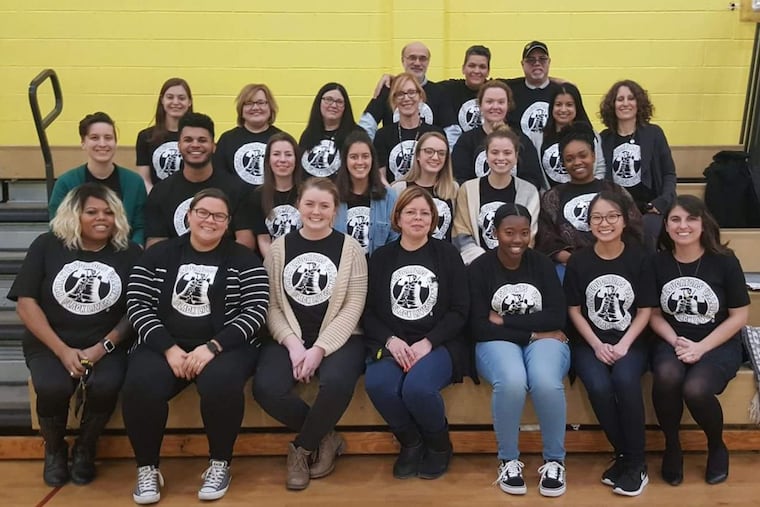Black Lives Matter Week of Action, born in Philly, goes national
Studying the Black Lives Matter movement in school "gives students a platform and the language that they need to talk about the injustices in society," said one Philadelphia English teacher said.

As they did last year, students in classrooms around Philadelphia are participating in lessons about the Black Lives Matter movement this week — second graders coloring pictures, high schoolers having frank conversations about social justice.
But this time, the movement has spread outside of the city in a major way. New York, Chicago, Los Angeles, and other school systems across the country — about 25 in all — and a local suburban district are all participating in some way. Beginning last summer, Philadelphia organizers connected with teachers around the U.S. to devise "the National Black Lives Matter Week of Action in Our Schools." Thousands of teachers have signed on; organizers estimate 80 schools locally are participating.
"I think this gives students a platform and the language that they need to talk about the injustices in society," said Clarice Brazas, an English teacher at the U School, a public high school in North Philadelphia.
The effort sprung from the Caucus of Working Educators, an activist group within the Philadelphia Federation of Teachers. It is not sponsored or sanctioned by the PFT or the Philadelphia School District. (The district is holding a monthlong series of events organized around Black History Month, including an art exhibit and speakers highlighting the history of black Philadelphia.)
Lee Whack, a city School District spokesman, said the district "encourages teachers to responsibly engage students around important issues to develop critical thinking skills and a respect for the exchange of ideas."
Locally, the school board of the William Penn School District in Delaware County endorsed the movement; so did the New Jersey Education Association, the state teachers' union.
The movement began growing last summer, when Philadelphia organizers connected with others around the work they had done last year.
"Organizers from New York were excited," said Shira Cohen, a teacher at Feltonville School of Arts and Sciences. "They said, Let's make it national. This is too important of an opportunity to pass up."
This year's week is centered on three demands organizers say would improve the school experience for students of color: ending zero-tolerance discipline for students, hiring and retaining teachers of color, and organizing antiracism training and multicultural studies in the curriculum.
In Philadelphia and elsewhere, the level of participation varies among students, teachers, and schools. Some are wearing T-shirts; some are teaching lessons; others are organizing lunchtime conversations for interested students. Organizers offer suggested lessons, from coloring pages of Harriet Tubman and "Black Youth Matter" for younger children to an exercise for high school students to examine stereotypes using theatrical monologues.
The Caucus of Working Educators has planned after-school events all week to reinforce the theme.
Angela Crawford, a teacher leader at Martin Luther King High School, shared the Black Lives Matter curriculum with her colleagues, some of whom said they were incorporating it into their lessons this week. Crawford herself is chatting with students at lunchtime around issues of relevance to the movement.
"They live in a world where they see injustices and inequalities every single day of their lives," said Crawford, a teacher for 18 years. "It's the shoes they walk in. It's important they have an opportunity to express how they feel, to find solutions."
Teaching about Black Lives Matter this week is a natural for Ismael Jimenez, who teaches African American History at Kensington High School for the Creative and Performing Arts. His students are examining the Black Lives Matter organization's guiding principles — concepts such as diversity and globalism — in the context of contemporary quotes, he said.
Though the movement is considered controversial and anti-police by some, Jimenez, who is on the national Black Lives Matter in Schools organizing board, said students have responded with universal enthusiasm, and he's encountered very little pushback in general.
"On our national Facebook page, we received some random hate mail through Messenger — 'I hope you guys die in a car accident, Black Lives Matter is a terrorist group," Jimenez said, "but in the Philadelphia context, we've had a lot of positive feedback. Everything is about social justice."
Seattle's school board addressed the possible controversy head-on, passing a resolution endorsing citywide classroom participation in the curriculum, noting that "shouting loudly that 'Black Lives Matter' does not negate our commitment to ALL of our students, but rather elevating Black students struggle to trust that our society values them, we must affirm that their lives, specifically, matter."
Cohen said the response nationwide is heartening, a sign that the movement is spreading. But the Philadelphia message is crucial, too.
"We want to make black studies bigger and bolder in the School District," said Cohen. "And the whitening of the teaching force is concerning. We want that to be reversed in a very deep and intentional way."